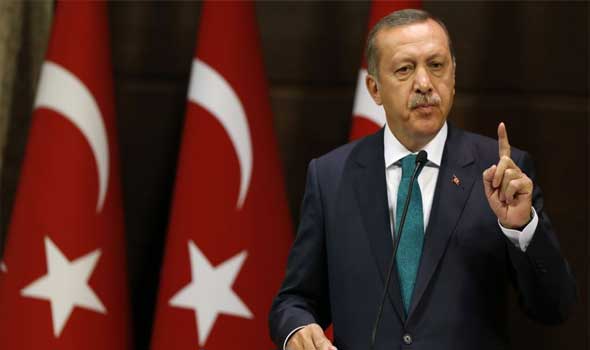In a TV address, Turkish President Recep Tayyip Erdogan has warned Russian President Vladimir Putin not to “play with fire” over Turkey’s downing of a Russian warplane on Syrian border.
Recep Tayyip Erdogan also said he wanted to meet Vladimir Putin “face-to-face” at climate talks in Paris to resolve the issue.
Vladimir Putin wants an apology from Turkey before he will speak to Recep Tayyip Erdogan, the Russian president’s aide said.
Russia has suspended its visa-free arrangement with Turkey in the latest of a range of retaliatory measures.
Turkey says the Russian warplane was in its airspace when the decision was taken to shoot it down on November 24 – Russia insists the plane was flying over Syria at the time.
Tensions have been heightened by the fact that the two countries are pursuing different aims in Syria.
Russia has been carrying out air strikes against opponents of President Bashar al-Assad since late September, while Turkey, which is a member of a US-led coalition, insists Bashar al-Assad must step down before any political solution to the crisis is found.
However, all are united in trying to rid the region of ISIS, also known as Daesh.
In a televised speech, Recep Tayyip Erdogan warned Russia it was “playing with fire to attack the Syrian opposition, who have international legitimacy, under the pretext of fighting against Daesh”.
The Turkish president said Moscow was also playing with fire to use the downing of the jet “as an excuse to make unacceptable accusations against us”, and accused Russians of “mistreating” Turkish citizens who were in the country for a trade fair.
Recep Tayyip Erdogan said he hoped to meet Vladimir Putin face-to-face on the sidelines of the climate summit in Paris next week “to bring the issue to a reasonable point. We are disturbed that the issue has been escalated”.
While he has refused to apologize, Recep Tayyip Erdogan did say on November 26 that had Turkey known the plane was Russian, “maybe we would have warned it differently”.
Vladimir Putin has firmly rejected any suggestion Turkey did not recognize the plane as Russian. He said it was easily identifiable and its coordinates had been passed on to Turkey’s ally, the US.
A senior Russian commander went further on November 27 and claimed the Russian warplane was “ambushed” by two Turkish F-15s.
Gen. Viktor Bondarev said Russian and Syrian radar data showed the F-16s had been flying in the area for more than an hour and the plane that fired the missile did so from 1.2 miles inside Syria.
The Russian jet was shot down 3.4 miles south of the Turkish border, he said.
The Turkish military earlier in the week released audio of what it said were repeated warnings to the Russian jet to change its course, and claimed the jet had spent 17 seconds in Turkish air space before being shot down.
Announcing the suspension of a visa-free travel regime with Turkey from January 1, Russian Foreign Minister Sergei Lavrov said he believed the Turkish leadership had “crossed the line of what is acceptable”.
On November 26, Russia said it was drafting a wide-ranging list of economic sanctions against Turkey that would hit food imports and joint investment projects among other things.
Turkey and Russia have important economic links. Russia is Turkey’s second-largest trading partner, while more than three million Russian tourists visited Turkey in 2014.
https://www.youtube.com/watch?v=CKEW8fcWjRk
